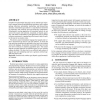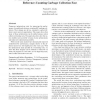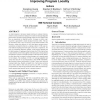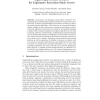85 search results - page 1 / 17 » A certified framework for compiling and executing garbage-co... |
ICFP
2010
ACM
13 years 4 months ago
2010
ACM
We describe the design, implementation, and use of a machinecertified framework for correct compilation and execution of programs in garbage-collected languages. Our framework ext...
ICFP
2000
ACM
13 years 8 months ago
2000
ACM
Compilers for polymorphic languages can use runtime type inspection to support advanced implementation techniques such as tagless garbage collection, polymorphic marshalling, and ...
IWMM
2007
Springer
13 years 10 months ago
2007
Springer
Numerous optimizations exist for improving the performance of nondeferred reference-counting (RC) garbage collection. Their designs are ad hoc, intended to exploit different count...
OOPSLA
2004
Springer
13 years 10 months ago
2004
Springer
As improvements in processor speed continue to outpace improvements in cache and memory speed, poor locality increasingly degrades performance. Because copying garbage collectors ...
CC
2006
Springer
13 years 8 months ago
2006
Springer
We propose a new language concept called "L-closures" for a running program to legitimately inspect/modify the contents of its execution stack. L-closures are lightweight...




